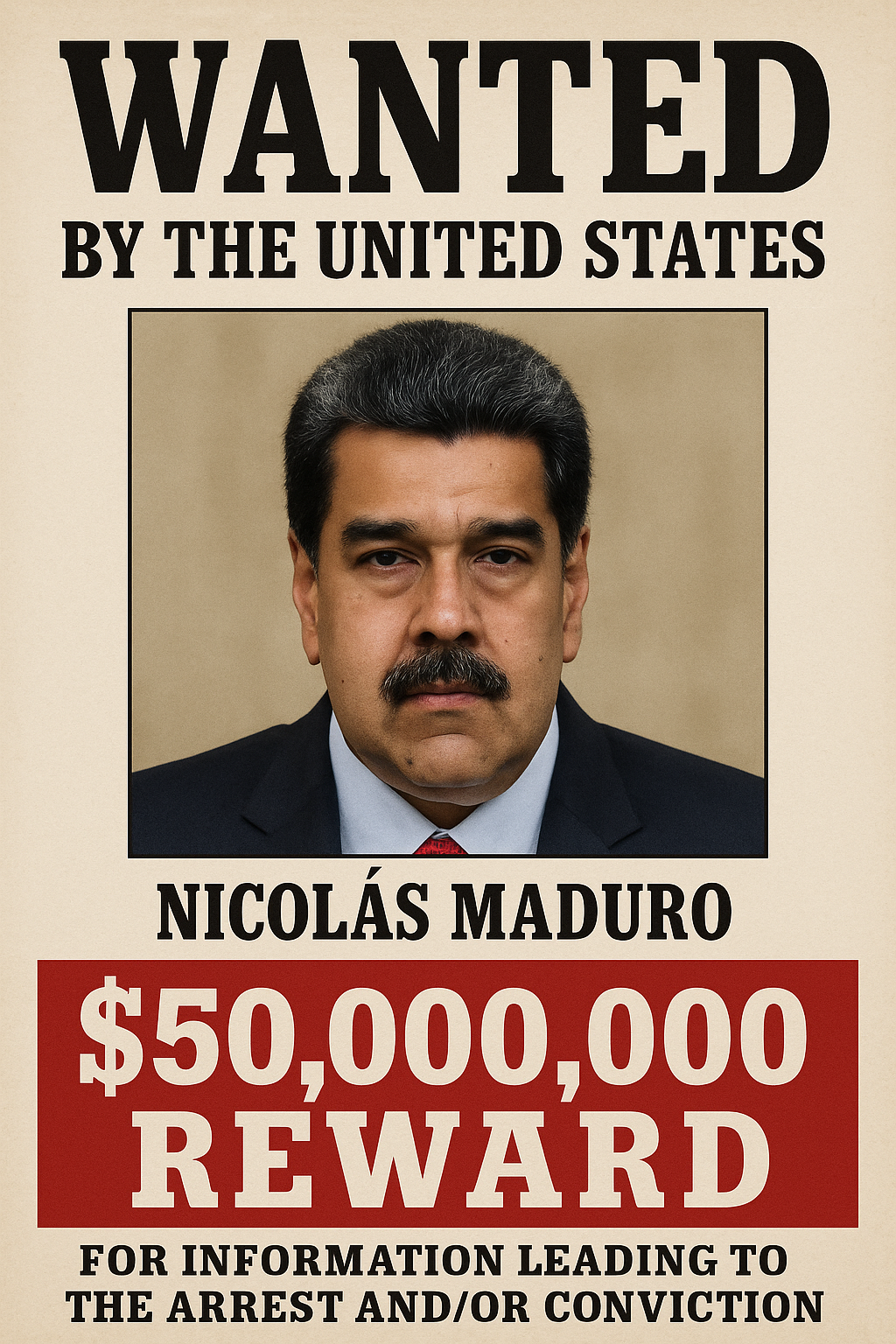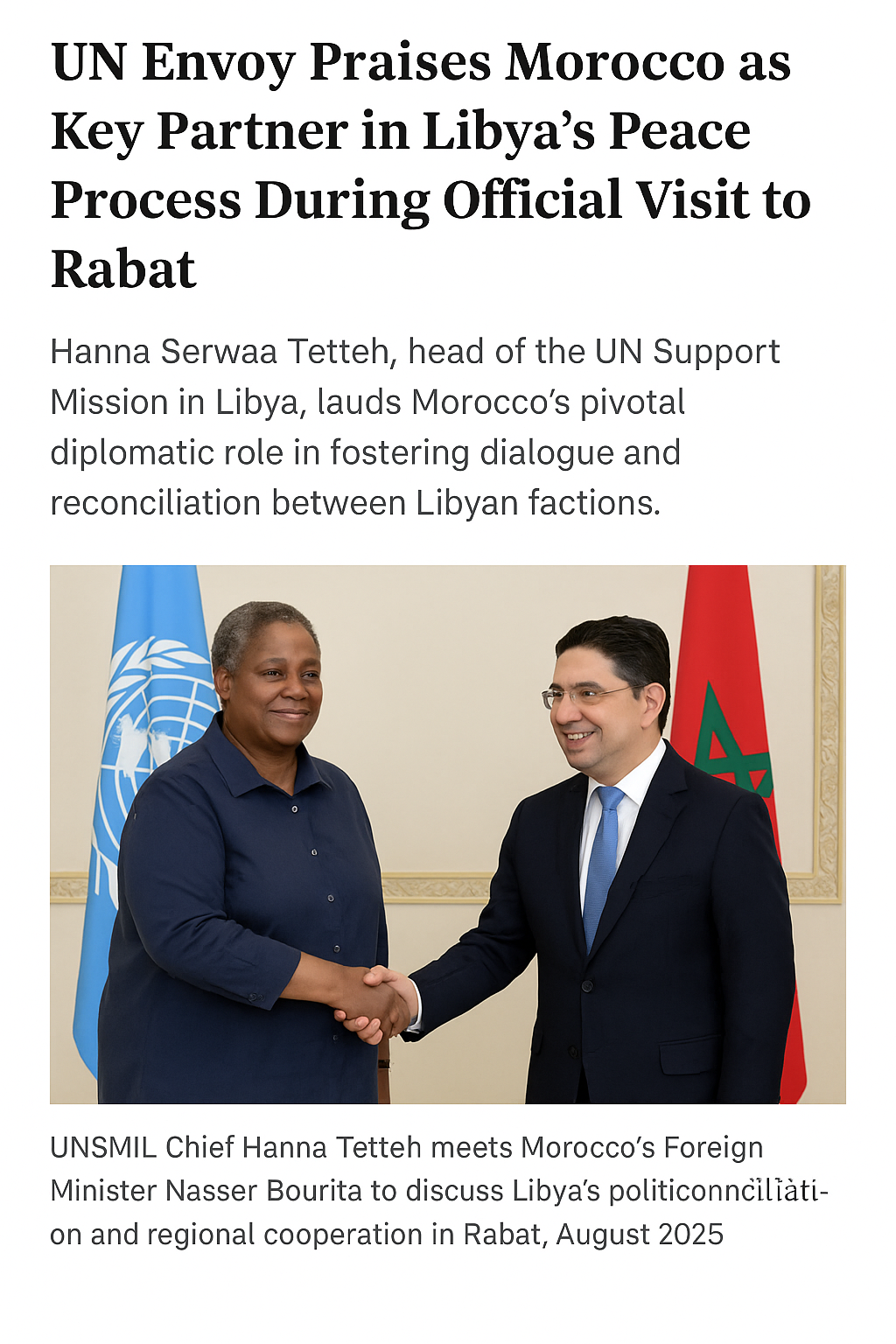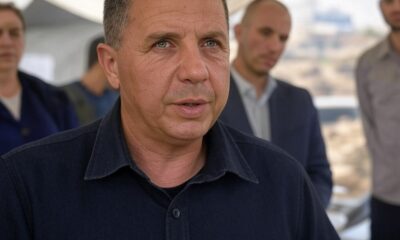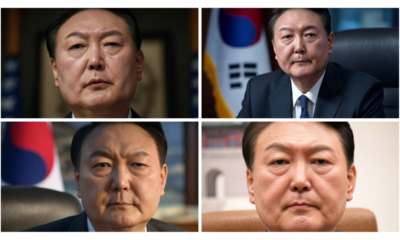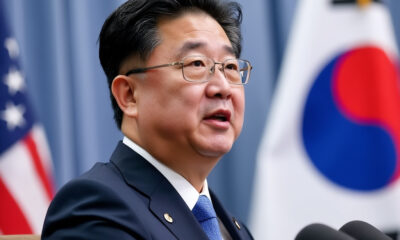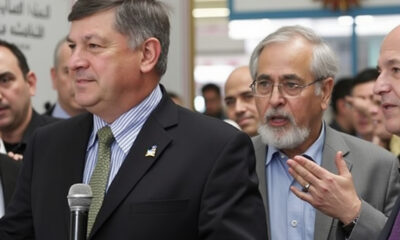politics
Hezbollah Leader Reportedly Killed: Hasan Nasrallah’s Death and Its Impact
Hasan Nasrallah, the leader of Hezbollah, was reportedly killed in an Israeli airstrike, marking a significant escalation in the ongoing conflict between Israel and Hezbollah. The reported incident occurred amid heightened tensions in the region, with Israel carrying out targeted military operations against Hezbollah positions in Lebanon. Nasrallah, who had led Hezbollah for decades, was instrumental in shaping the group’s political and militant strategy, transforming it into a formidable regional force with significant influence.
Background of Hezbollah and Hasan Nasrallah
Hezbollah, founded in the 1980s during the Lebanese Civil War, emerged as a Shiite militant group with a primary mission to resist Israeli presence in Lebanon. Under Nasrallah’s leadership since 1992, following the death of the group’s founder Abbas al-Musawi, Hezbollah expanded its role from a militant group to a significant political player in Lebanon. Nasrallah’s leadership was characterized by a mix of military confrontation with Israel and active participation in Lebanese politics, as Hezbollah became part of the government coalition.
Nasrallah was known for his fiery speeches, advocating resistance against Israeli and Western influence in the region. He was often perceived as a key figure representing Iran’s interests in Lebanon, further complicating the already delicate balance of power in the Middle East. His influence extended beyond Lebanon, as Hezbollah actively supported Syrian President Bashar al-Assad during the Syrian Civil War and provided military assistance to Shiite militias in Iraq and Yemen.
The Incident
Reports of Nasrallah’s death emerged following an Israeli airstrike that targeted a Hezbollah stronghold. According to Israeli and Lebanese sources, the strike was part of Israel’s broader military campaign aimed at weakening Hezbollah’s infrastructure in southern Lebanon. The incident took place in a heavily fortified area, with Israeli drones and jets carrying out multiple attacks on suspected Hezbollah positions.
While Israel has neither confirmed nor denied responsibility for the strike, it is widely speculated that the operation was a calculated effort to eliminate Hezbollah’s leadership. Nasrallah was known to frequently change his locations due to concerns over Israeli surveillance, and his whereabouts were often kept secret to avoid such targeted strikes.
Regional Reaction
The news of Nasrallah’s reported death has sent shockwaves across Lebanon and the broader Middle East. In Beirut, Hezbollah supporters took to the streets in an outpouring of grief and anger, condemning the Israeli strike and vowing retaliation. Nasrallah was not only a political and military leader but also a symbol of resistance for many Lebanese Shiites and supporters of Hezbollah. His death, if confirmed, could lead to a power vacuum within the group, raising questions about the future of Hezbollah’s strategy and operations.
Iran, a major backer of Hezbollah, has condemned the attack and vowed that “the resistance will continue,” signaling a likely increase in tension between Israel and Iran-backed groups. Tehran’s support for Hezbollah has been a critical component of its regional strategy, and the loss of Nasrallah represents a significant blow to its influence in Lebanon.
In Israel, the reaction has been mixed. While some view the reported killing as a major success in Israel’s long-standing effort to dismantle Hezbollah, others are concerned about the potential backlash. Hezbollah has vowed “severe consequences” in response, raising fears of renewed border clashes or even a larger-scale conflict. Israel has bolstered its northern defenses, anticipating possible retaliatory attacks from Hezbollah.
Political Impact in Lebanon
Nasrallah’s death, if confirmed, is likely to have profound implications for Lebanon, which is already grappling with severe political and economic crises. Hezbollah’s political wing has been a dominant force in Lebanon’s government, and the loss of its leader could destabilize an already fragile state. Nasrallah’s ability to maintain cohesion within Hezbollah, balancing its militant and political wings, was seen as crucial to the group’s influence. Without his leadership, internal power struggles could emerge, potentially weakening Hezbollah’s control.
The Lebanese government has expressed concern over the ramifications of Nasrallah’s death. The country is currently experiencing one of the worst economic crises in its history, with a collapsing currency, widespread poverty, and a lack of basic services. The potential for increased conflict between Hezbollah and Israel could further exacerbate these issues, pushing Lebanon into deeper instability.
Potential for Escalation
The killing of Hasan Nasrallah could mark a turning point in the Israel-Hezbollah conflict. Hezbollah has already promised retaliation, and there is concern that the group’s response could lead to an all-out confrontation. Previous conflicts between Israel and Hezbollah, such as the 2006 Lebanon War, resulted in significant casualties and widespread destruction in Lebanon. A similar escalation now could be even more devastating, given the current geopolitical dynamics and Hezbollah’s increased military capabilities.
Israel, for its part, has increased its military readiness along the northern border, deploying additional troops and fortifications in anticipation of a possible Hezbollah response. The Israeli government has warned Hezbollah against any aggressive moves, stating that any retaliation will be met with “full force.”
International Response
The international community has responded with calls for restraint. The United Nations has expressed concern over the potential for a new conflict in the region, urging both sides to avoid further escalation. The United States, which considers Hezbollah a terrorist organization, has supported Israel’s right to defend itself but has also called for de-escalation to prevent a broader regional conflict.
Russia, which maintains ties with both Hezbollah and Israel, has offered to mediate to prevent the situation from spiraling out of control. The European Union has also voiced concern, emphasizing the importance of maintaining stability in Lebanon, particularly given the country’s ongoing economic hardships.
Conclusion
The reported killing of Hasan Nasrallah represents a critical juncture for Hezbollah, Israel, and the broader Middle East. His death could lead to significant shifts in Hezbollah’s internal dynamics, impact Lebanon’s already precarious political situation, and heighten the risk of conflict with Israel. As the region watches closely, the coming days will be crucial in determining whether this incident sparks a new cycle of violence or if international mediation can help prevent further escalation.
business
🇲🇦 King Mohammed VI’s Speech Sparks Heated Debate in Parliament — “جيل زد يُجيب”
Rabat — October 2025
Inside Morocco’s Parliament, tension and reflection filled the air just hours after His Majesty King Mohammed VI delivered his opening-session speech. What was meant as a national roadmap quickly turned into a day of open confrontation, emotional testimonies, and unexpected admissions from members of both majority and opposition blocs.
🏛️ A Speech That Touched Nerves
The King’s address, described by analysts as “direct and reform-oriented,” called for greater social justice, job creation, and balanced development across Morocco’s regions.
“No village left forgotten, no coast without a hand,” the King declared — a message that resonated deeply with citizens and lawmakers alike.
Within hours, parliamentary corridors buzzed with interviews, arguments, and introspection. Some MPs hailed the speech as “a moral reset,” while others questioned whether the government was capable of turning royal vision into tangible results.
🧠 From Rabat to the Sahara — Gen Z Responds
Younger members of Parliament — labeled as جيل زد (Gen Z) — became the focus of cameras and public curiosity. Many expressed frustration at what they see as a widening gap between political promises and everyday realities faced by Moroccan youth.
“The King spoke about unity and work. We agree — but the youth need a chance to prove themselves,” said one 28-year-old deputy.
“We have the energy; the system just needs to open its doors.”
Another young MP caused a social-media storm after saying that “in some ways, Moroccan social values are stronger than Germany’s.”
Critics accused him of downplaying Europe’s economic strength, while others applauded his pride in Moroccan family cohesion.
He later clarified his words, emphasizing that every nation faces challenges — and that Morocco’s real wealth lies in its people.
💬 Resignation, Reflection, and Responsibility
Just a week earlier, one deputy had submitted his resignation in protest over what he called “a lack of listening to the new generation.”
After the King’s address, he withdrew it.
“The royal speech gave me renewed hope. This is not the time to quit — it’s time to work,” he told reporters.
Across party lines, both RNI and PAM youth wings echoed similar messages: commitment to reform, but also impatience with bureaucracy.
Several MPs criticized ministers who, they said, “do not answer calls, do not reply to written questions, and have lost touch with citizens.”
⚖️ Opposition Voices: ‘A Government in Denial’
Members of the opposition used the session to accuse the cabinet of denial and poor communication, arguing that ministers are “living in a different reality” from citizens struggling with prices and unemployment.
“The royal messages were clear,” said one opposition leader. “The problem is not the King’s vision — it’s implementation.”
🌍 Morocco’s Path Forward
Analysts note that the King’s address aligned with long-standing themes: national cohesion, balanced territorial development, and respect for dignity in public service.
But the 2025 context — economic pressure, youth disillusionment, and the digital activism of Gen Z — gives these calls new urgency.
“This generation communicates differently,” said a policy researcher. “If institutions don’t adapt, they’ll lose credibility.”
🕊️ A Message Beyond Politics
As the parliamentary session ended, one young MP summed up the mood:
“الملك تكلّم… ونحن سنُجيب بالعمل — The King spoke, and we will answer through action.”
For now, the chamber that often echoes with partisan debates found itself united — briefly — under a single message:
Morocco’s future belongs to its youth, but responsibility belongs to everyone.
business
From Potatoes to Paleontology: Morocco’s Big Wins on August 14, 2025
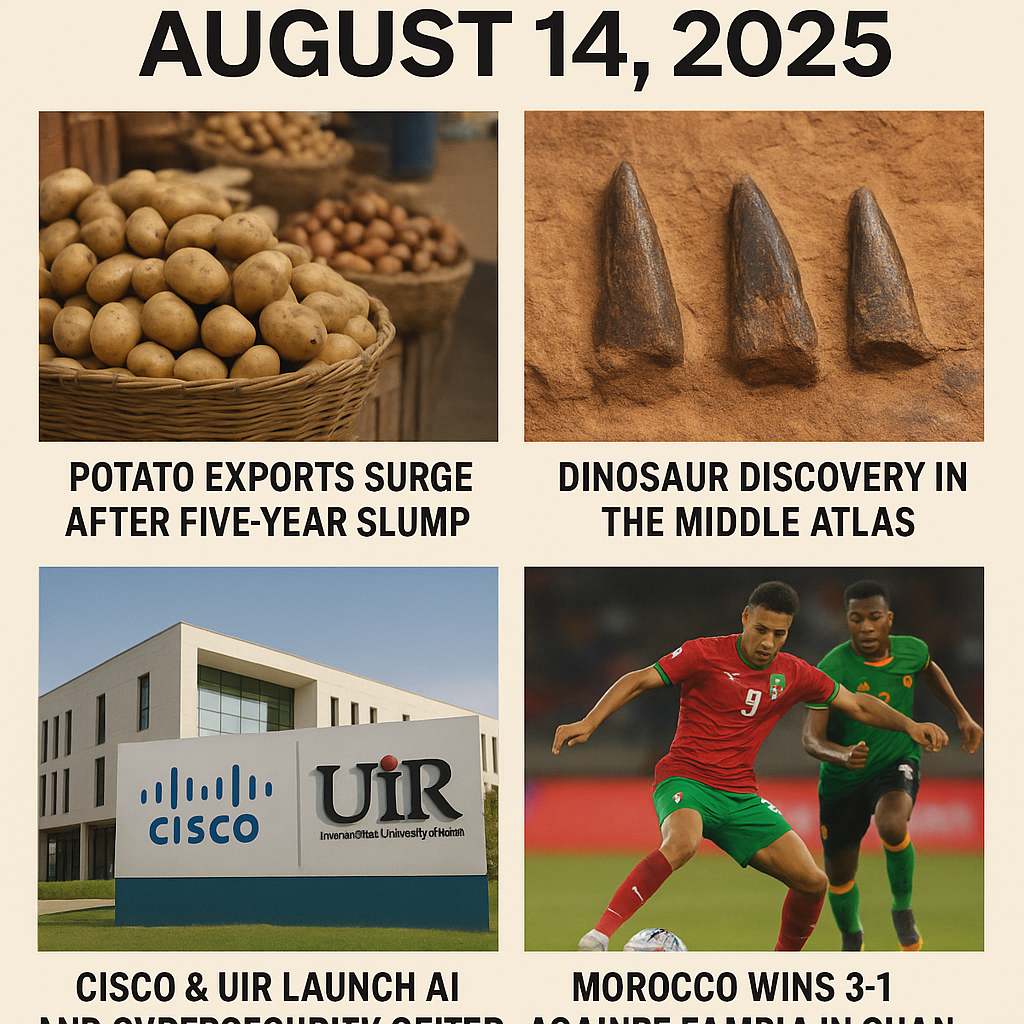
From potatoes to paleontology, Morocco posts gains across economy, science, and sport, while DV-2025 visa delays put pressure on applicants.
Morocco’s potato exports surged after a five-year slump, paleontologists uncovered the country’s oldest Turiasaurian teeth in the Middle Atlas, and UIR teamed with Cisco on a new AI & cybersecurity center. Authorities also approved the Amazigh name “Massinissa,” Morocco beat Zambia 3–1 at CHAN, and DV-2025 lottery winners sounded alarms over stalled interviews. FreshPlazaMorocco World News+3Morocco World News+3Morocco World News+3Hespress
The Briefing
Morocco’s news cycle on August 14, 2025 offered a snapshot of a country diversifying—export recovery in agri-food, frontier science with Jurassic-era finds, digital capacity-building through a new AI/cyber hub, and a culture-rights win on Amazigh naming—rounded off by a CHAN victory and visa-processing anxieties for DV-2025 winners. FreshPlazaMorocco World News+3Morocco World News+3Morocco World News+3Hespress
Economy — Potatoes Are Back
After five years of decline, Morocco’s ware-potato exports rebounded to 42,900 tons worth US$14.9 million between July 2024 and May 2025—a 5.7× increase versus the prior season. Analysts credit renewed West African trade links and firmer European demand. The uptick helps farmers and cold-chain logistics while testing resilience ahead of the 2025–26 campaign. FreshPlaza
Explainer takeaway: A stronger potato campaign increases rural incomes and stabilizes supply chains; monitoring fertilizer prices, shipping rates, and weather will indicate whether the rebound is durable.
Science — 160-Million-Year-Old Giants
Researchers identified three dinosaur teeth from the Middle Atlas (El Mers III Formation), marking the oldest evidence of Turiasauria on mainland Africa—a Middle Jurassic lineage previously best known from Iberia. The peer-reviewed study tightens biogeographic links between North Africa and Europe and invites fresh fieldwork in Boulemane province. Morocco World NewsYabiladiResearchGate
Explainer takeaway: Morocco’s Jurassic strata continue to fill global fossil gaps, boosting scientific tourism and training opportunities for local geoscience programs.
Technology — UIR × Cisco Unveil AI & Cybersecurity Center
The International University of Rabat (UIR) and Cisco signed an MoU to create a Cisco EDGE Incubation Center focused on AI and cybersecurity, aligning with Morocco’s Digital 2030 ambitions. The hub aims to link academia, startups, and public services while leveraging Cisco Networking Academy pathways. Morocco World NewsMap NewsMedafrica TimesLinkedIn
Explainer takeaway: Expect new pipelines for SOC talent, secure-cloud skills, and AI safety research—areas where Morocco seeks digital sovereignty and exportable know-how.
Society — A Win for Amazigh Naming Rights
Following an initial refusal, Meknes authorities approved the Amazigh name “Massinissa.” The reversal reflects ongoing normalization of Amazigh names in civil registry practice and reduces administrative friction for families seeking culturally rooted identities. Morocco World NewsHespressFacebook
Explainer takeaway: Documentation shapes access to education, healthcare, and travel; clearer acceptance of Amazigh names streamlines everyday life and affirms linguistic rights.
Sport — CHAN Boost: Morocco 3–1 Zambia
Morocco’s locally based national team defeated Zambia 3–1, strengthening its CHAN 2024 (played in 2025) campaign and securing a quarterfinal berth. Wins at CHAN raise player visibility, support domestic leagues, and can lift transfer valuations for homegrown talent. Hespress
Explainer takeaway: CHAN is a showcase for domestic football systems; Morocco’s result supports the broader talent pipeline from Botola clubs to continental competition.
Migration — DV-2025 Interview Delays
DV-2025 lottery winners in Morocco report stalled interview scheduling at the U.S. Consulate in Casablanca as the September 30, 2025 fiscal-year deadline nears, raising fears that selectees could time out despite “current” case numbers. Civil-society calls urge transparent scheduling and capacity updates. Morocco World News
Explainer takeaway: Diversity Visas are time-bound; absent appointments by the end of the fiscal year, eligibility ends—even for qualified selectees. Applicants should ensure DS-260s are complete and monitor consular notices.
What to Watch Next
- Agri-exports: Does the potato rally carry into Q4 logistics and pricing? FreshPlaza
- Science & tourism: Will new Middle Atlas digs expand fossil trails and museum programs? Morocco World News
- Talent & tech: Can the UIR–Cisco hub seed startups and feed national SOC capacity by 2026? Morocco World News
- Civil registry: Are further Amazigh naming cases resolved consistently across regions? Hespress
- CHAN: Injury management and fatigue as fixtures compress. Hespress
- DV-2025: Any scheduling updates from Casablanca before Sept. 30. Morocco World News
International
From Rabat to the Sahel: Moroccan Builders Lead Africa’s Largest Road Project

Strategic Project to Boost Trade and Land Connectivity Across West Africa with Chinese Financing
Ouagadougou – From Our International Correspondent
In what is being hailed as a “game-changing leap” for Morocco’s presence in Africa, authorities in Burkina Faso announced today that a consortium of two Moroccan companies has won a landmark contract to construct a highway linking the capital Ouagadougou to Bamako, the capital of Mali. The deal marks the largest road infrastructure project ever awarded on the continent.
Fully financed through a Chinese loan to the West African nations, the project will span hundreds of kilometers, serving as a strategic trade corridor that will enhance connectivity between Morocco’s Atlantic ports and the Sahel region. Officials say the highway will drastically cut travel times, reduce shipping costs, and stimulate cross-border commerce.
Transforming Africa’s Trade Map
According to Burkina Faso’s Ministry of Infrastructure, the highway will be built to international standards, complete with service stations, logistics hubs, and rest areas along the route.
“This project is not just a road—it is a bridge of development between our peoples, with profound economic and social impact,” said the country’s Infrastructure Minister in a statement to state television.
Moroccan executives welcomed the news, calling it a vote of confidence in Moroccan engineering and infrastructure capabilities.
“We are proud to be part of this historic undertaking that strengthens African integration and places Morocco at the heart of the continent’s major transformations,” said the CEO of one of the winning companies.
Chinese Financing, Moroccan Expertise
The project is part of China’s broader infrastructure investment strategy under the Belt and Road Initiative. Industry analysts say Morocco’s success in securing such a high-profile, cross-border project is a sign of its growing competitiveness against major global construction firms.
Human and Social Impact
Beyond its economic benefits, the highway is expected to improve access to healthcare and education in remote rural communities, facilitate the transport of agricultural goods to urban markets, and create thousands of direct and indirect jobs in both Burkina Faso and Mali.
A Strategic Backbone
The route is seen as a key piece of the regional connectivity vision linking Morocco with West African nations, especially as Moroccan investment expands in transport, energy, and telecommunications. It will also give Sahel countries better access to Atlantic ports, reducing their geographical isolation and enhancing their role in continental trade.

